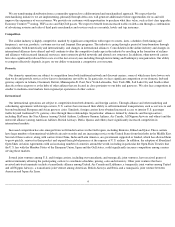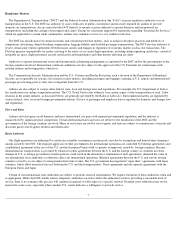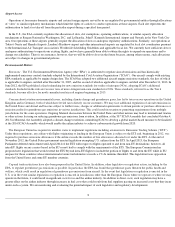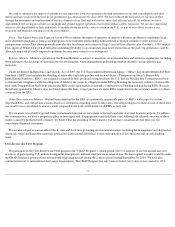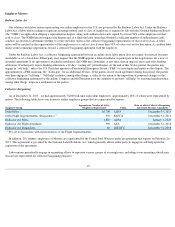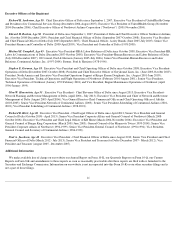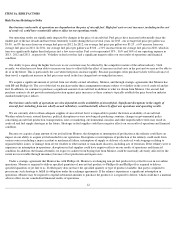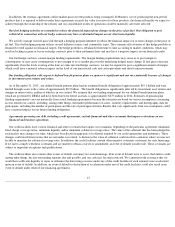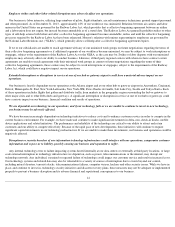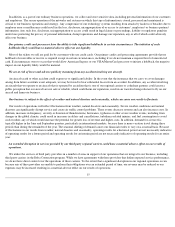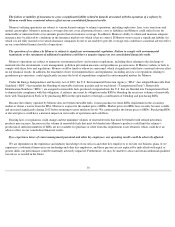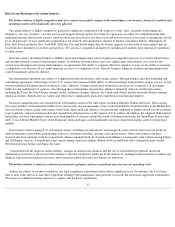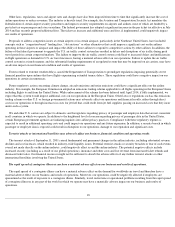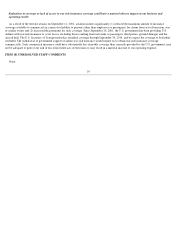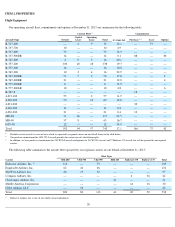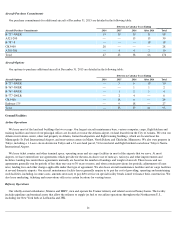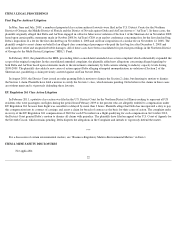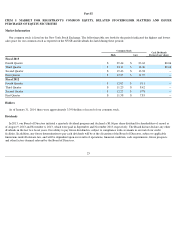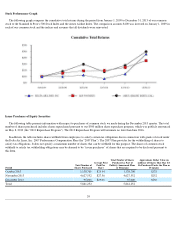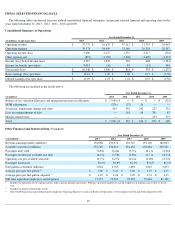Delta Airlines 2013 Annual Report Download - page 22
Download and view the complete annual report
Please find page 22 of the 2013 Delta Airlines annual report below. You can navigate through the pages in the report by either clicking on the pages listed below, or by using the keyword search tool below to find specific information within the annual report.
The failure or inability of insurance to cover a significant liability related to hazards associated with the operation of a refinery by
Monroe would have a material adverse effect on our consolidated financial results.
Monroe's refining operations are subject to various hazards unique to refinery operations, including explosions, fires, toxic emissions and
natural catastrophes. Monroe's insurance coverage does not cover all potential losses, costs or liabilities and Monroe could suffer losses for
uninsurable or uninsured risks or in amounts greater than its insurance coverage. In addition, Monroe's ability to obtain and maintain adequate
insurance may be affected by conditions in the insurance market over which it has no control. If Monroe were to incur a significant liability for
which it is not fully insured or for which insurance companies do not or are unable to provide coverage, this could have a material adverse effect
on our consolidated financial results of operations.
The operation of a refinery by Monroe is subject to significant environmental regulation. Failure to comply with environmental
regulations or the enactment of additional regulation could have a negative impact on our consolidated financial results.
Monroe's operations are subject to numerous environmental laws and extensive regulations, including those relating to the discharge of
materials into the environment, waste management, pollution prevention measures and greenhouse gas emissions. If Monroe violates or fails to
comply with these laws and regulations, Monroe could be fined or otherwise sanctioned, which if significant could have a material adverse effect
on our financial results. In addition, the enactment of new environmental laws and regulations, including any laws or regulations relating to
greenhouse gas emissions, could significantly increase the level of expenditures required for environmental matters for Monroe.
Under the Energy Independence and Security Act of 2007, the U.S. Environmental Protection Agency (“EPA”) has adopted Renewable Fuel
Standards (“RFS”) that mandate the blending of renewable fuels into gasoline and on-road diesel ("Transportation Fuels"). Renewable
Identification Numbers (“RINs”) are assigned to renewable fuels produced or imported into the U.S. that are blended into Transportation Fuels
to demonstrate compliance with this obligation. A refinery may meet its obligation under RFS by blending the necessary volumes of renewable
fuels with Transportation Fuels or by purchasing RINs in the open market or through a combination of blending and purchasing RINs.
Because the refinery operated by Monroe does not blend renewable fuels, it must purchase its entire RINs requirement in the secondary
market or obtain a waiver from the EPA. Monroe is exposed to the market price of RINs. Market prices for RINs have recently become volatile
and increased significantly during 2013 before returning to more moderate levels. We cannot predict the future prices of RINs. Purchasing RINs
at elevated prices could have a material impact on our results of operations and cash flows.
Existing laws or regulations could change and the minimum volumes of renewable fuels that must be blended with refined petroleum
products may increase. Increases in the volume of renewable fuels that must be blended into Monroe's products could limit the refinery's
production if sufficient numbers of RINs are not available for purchase or relief from this requirement is not obtained, which could have an
adverse effect on our consolidated financial results.
If we experience losses of senior management personnel and other key employees, our operating results could be adversely affected.
We are dependent on the experience and industry knowledge of our officers and other key employees to execute our business plans. If we
experience a substantial turnover in our leadership and other key employees, and these persons are not replaced by individuals with equal or
greater skills, our performance could be materially adversely impacted. Furthermore, we may be unable to attract and retain additional qualified
executives as needed in the future.
16


